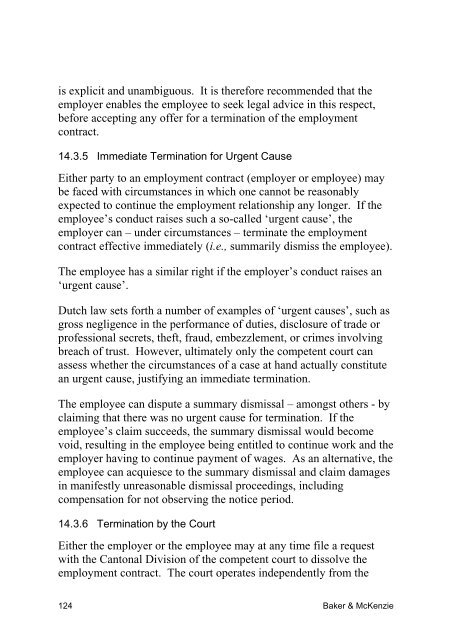Doing Business in the Netherlands 2012 - American Chamber of ...
Doing Business in the Netherlands 2012 - American Chamber of ...
Doing Business in the Netherlands 2012 - American Chamber of ...
Create successful ePaper yourself
Turn your PDF publications into a flip-book with our unique Google optimized e-Paper software.
is explicit and unambiguous. It is <strong>the</strong>refore recommended that <strong>the</strong><br />
employer enables <strong>the</strong> employee to seek legal advice <strong>in</strong> this respect,<br />
before accept<strong>in</strong>g any <strong>of</strong>fer for a term<strong>in</strong>ation <strong>of</strong> <strong>the</strong> employment<br />
contract.<br />
14.3.5 Immediate Term<strong>in</strong>ation for Urgent Cause<br />
Ei<strong>the</strong>r party to an employment contract (employer or employee) may<br />
be faced with circumstances <strong>in</strong> which one cannot be reasonably<br />
expected to cont<strong>in</strong>ue <strong>the</strong> employment relationship any longer. If <strong>the</strong><br />
employee’s conduct raises such a so-called ‘urgent cause’, <strong>the</strong><br />
employer can – under circumstances – term<strong>in</strong>ate <strong>the</strong> employment<br />
contract effective immediately (i.e., summarily dismiss <strong>the</strong> employee).<br />
The employee has a similar right if <strong>the</strong> employer’s conduct raises an<br />
‘urgent cause’.<br />
Dutch law sets forth a number <strong>of</strong> examples <strong>of</strong> ‘urgent causes’, such as<br />
gross negligence <strong>in</strong> <strong>the</strong> performance <strong>of</strong> duties, disclosure <strong>of</strong> trade or<br />
pr<strong>of</strong>essional secrets, <strong>the</strong>ft, fraud, embezzlement, or crimes <strong>in</strong>volv<strong>in</strong>g<br />
breach <strong>of</strong> trust. However, ultimately only <strong>the</strong> competent court can<br />
assess whe<strong>the</strong>r <strong>the</strong> circumstances <strong>of</strong> a case at hand actually constitute<br />
an urgent cause, justify<strong>in</strong>g an immediate term<strong>in</strong>ation.<br />
The employee can dispute a summary dismissal – amongst o<strong>the</strong>rs - by<br />
claim<strong>in</strong>g that <strong>the</strong>re was no urgent cause for term<strong>in</strong>ation. If <strong>the</strong><br />
employee’s claim succeeds, <strong>the</strong> summary dismissal would become<br />
void, result<strong>in</strong>g <strong>in</strong> <strong>the</strong> employee be<strong>in</strong>g entitled to cont<strong>in</strong>ue work and <strong>the</strong><br />
employer hav<strong>in</strong>g to cont<strong>in</strong>ue payment <strong>of</strong> wages. As an alternative, <strong>the</strong><br />
employee can acquiesce to <strong>the</strong> summary dismissal and claim damages<br />
<strong>in</strong> manifestly unreasonable dismissal proceed<strong>in</strong>gs, <strong>in</strong>clud<strong>in</strong>g<br />
compensation for not observ<strong>in</strong>g <strong>the</strong> notice period.<br />
14.3.6 Term<strong>in</strong>ation by <strong>the</strong> Court<br />
Ei<strong>the</strong>r <strong>the</strong> employer or <strong>the</strong> employee may at any time file a request<br />
with <strong>the</strong> Cantonal Division <strong>of</strong> <strong>the</strong> competent court to dissolve <strong>the</strong><br />
employment contract. The court operates <strong>in</strong>dependently from <strong>the</strong><br />
124 Baker & McKenzie





![912.025 AmCham News [1] - American Chamber of Commerce in ...](https://img.yumpu.com/9328612/1/190x127/912025-amcham-news-1-american-chamber-of-commerce-in-.jpg?quality=85)

